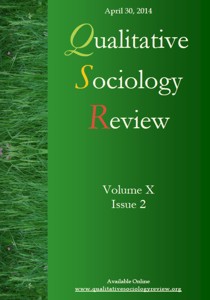Optimizing the Epistemological Potential of Focus Groups in Research on a Contested Issue
DOI:
https://doi.org/10.18778/1733-8077.10.2.02Keywords:
Communicative Interaction, Conflict, Conversational Exchange, Constructivism, Epistemology, Exchange, Interaction Ritual, Negotiated Knowledge, Power and Agency, Sociable InteractionAbstract
This article explores the potential of the focus group to generate analyzable social interaction. We investigate the ways in which group interaction may lead to new insights using examples from a 2011 study on transformation at a South African university campus. Certain aspects of sociable interaction, such as communicative interaction, power and agency, conflict, as well as exchange are touched upon and their roles in the intersubjective construction of reality are emphasized.
We also look at the role of the facilitator in setting up a successful focus group session and the ways in which a naturalistic interactional setting may compensate for the relative unnatural nature of the group situation. Our argument is for the realization of the potential of the focus group as a qualitative method of data collection that is inherently geared towards generating understanding of contested issues, as it allows for an exciting positioning of the researcher between that of interviewer and participant observer, readily able to experience interactional exchange first hand while subtly directing the group conversation into areas of special interest. We believe that the unique epistemological possibilities of the focus group merit a re-engagement with the method by any social scientist interested in the dynamics underlying the social construction of reality, as it offers a window into the ways in which unfolding reality is intersubjectively contested, debated, and finally agreed upon.
Downloads
References
Bloor, Michael et al. 2001. Focus Groups in Social Research. London: Sage.
Google Scholar
DOI: https://doi.org/10.4135/9781849209175
Collins, Randall. 1981. “On the Microfoundations of Macrosociology.” American Journal of Sociology 86(5):984-1014.
Google Scholar
DOI: https://doi.org/10.1086/227351
Collins, Randall. 2004. Interaction Ritual Chains. Princeton, NJ: Princeton University Press.
Google Scholar
Flick, Uwe. 2009. An Introduction to Qualitative Research. 2nd ed. London: Sage.
Google Scholar
Gamson, William A. 1992. Talking Politics. Cambridge: Cambridge University Press.
Google Scholar
Morgan, David L. 1988. Focus Groups as Qualitative Research. Newbury Park, CA: Sage.
Google Scholar
Silverman, David, (ed.). 2011. Qualitative Research: Issues of Theory, Method and Practice. 3rd ed. London: Sage.
Google Scholar
Warr, Deborah J. 2007. “‘It was fun… but we don’t usually talk about these things’: Analyzing Sociable Interaction in Focus Groups.” Qualitative Inquiry 11(2):200-225.
Google Scholar
DOI: https://doi.org/10.1177/1077800404273412
Wilkinson, Sue. 2004. “Focus Group Research.” Pp. 177-199 in Qualitative Research: Theory, Method and Practice. 2nd ed., edited by D. Silverman. London: Sage.
Google Scholar
Downloads
Published
How to Cite
Issue
Section
License

This work is licensed under a Creative Commons Attribution-NonCommercial-NoDerivatives 4.0 International License.











